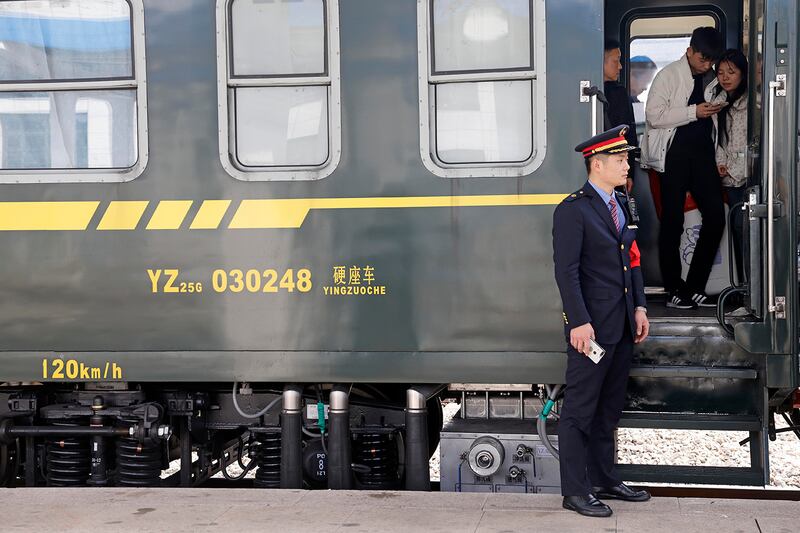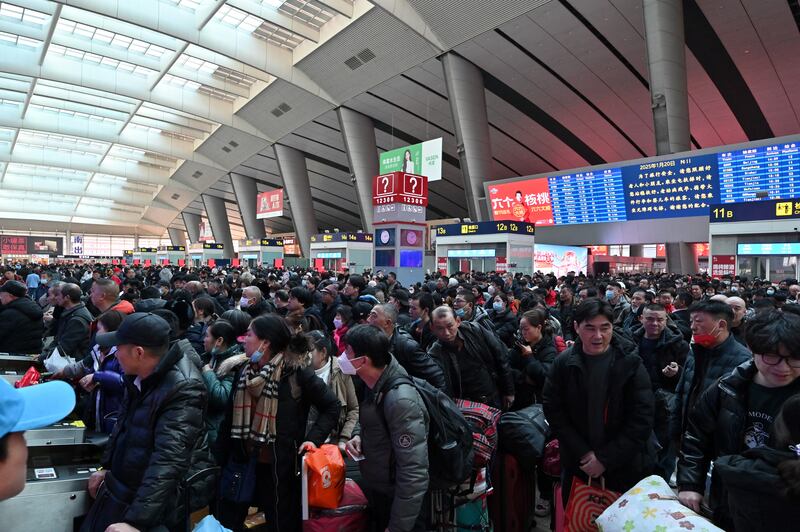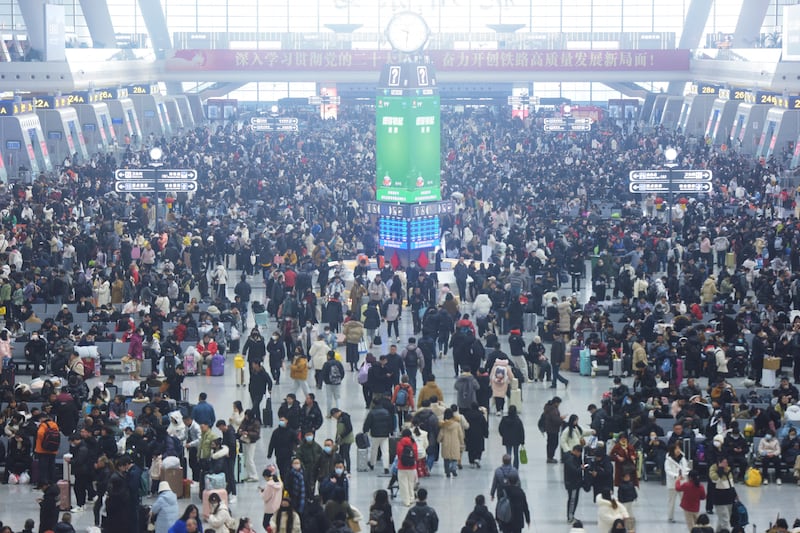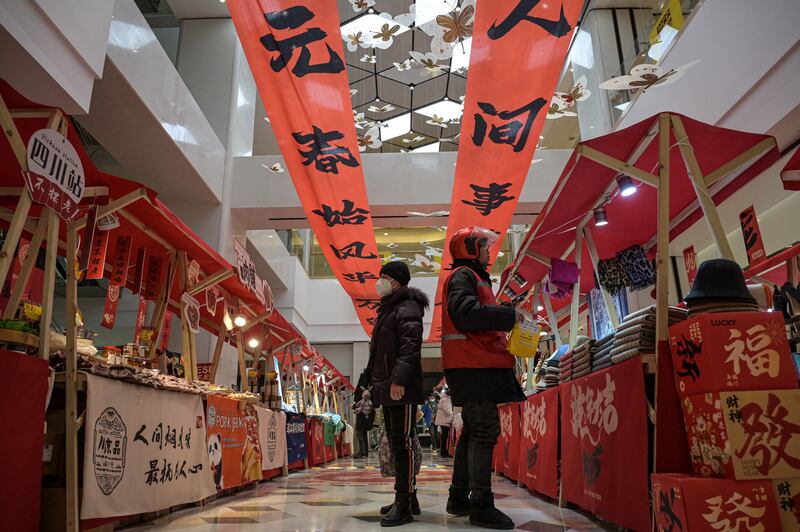Ordinary Chinese are taking to trains, planes and automobiles amid the Lunar New Year travel rush that will see hundreds of millions head home to usher in the Year of the Snake, but the economic downturn is biting deep, sending many to the bottom of the ladder.
Many are taking to the older, slower “green trains,” rather than those on the country’s formidable high-speed rail network, as social media users traded money-saving tips ahead of China’s biggest annual festival.
Many of the high-speed trains are noticeably empty, with people piling onto slower trains in search of cheaper tickets, residents told RFA Mandarin in recent interviews.

“This is the carriage during the Spring Festival travel rush this year,” user @Guangzhou_photographer said in a social media post with a video clip. “Where is everyone?”
Chinese state media describe the rush as “the world’s largest annual human migration,” and the authorities are expecting some 9 billion trips over the 40-day travel period, which includes the Lunar New Year on Jan. 29 and the subsequent public holiday that ends Feb. 22.
“More electric car owners and foreign tourists are expected to join the annual travel frenzy, traditionally featuring millions of migrant workers and others living far from their hometowns who head back to reunite with family and celebrate China’s most important festival,” state news agency Xinhua reported on Jan. 14.
“Are people not going home ... this year, or are you all walking or jogging home instead?” they said, using the official government name for the Lunar New Year celebration.

A resident of the southern city of Guangzhou who gave only the surname Hu for fear of reprisals said that he and a lot of his friends are sticking to the older, slower “green train” network this year, as high-speed rail tickets are several times the price of regular trains.
“It takes nine hours to get from Guangzhou to Changsha on the green train, for just 100 yuan (US$13) or a little more,” Hu said. “The high-speed rail would cost nearly 400 yuan (US$55), which is three or four times the cost of the green train.”
“There are a lot more people taking green trains this year than in previous years, and they are packed out with people and luggage in the aisles and the space by the doors, a lot of people using the toilets,” he said.
He said that despite the flagging economy leaving many struggling financially, the government has slashed the number of green trains in recent years, making them even more crowded.
‘You have to tighten your belt’
While China’s state media continues to pump out positive stories of economic recovery, many ordinary people in China are struggling to get by, and those who speak out about the situation are quickly silenced.
Last month, censors took down a speech that went viral from economist Dong Shanwen, who warned that youth unemployment was tanking the economy, and that official growth figures had hugely underestimated the problem.
RELATED STORIES
Xi Jinping’s talk of ‘rainbows’ belies simmering public anger over China’s economy
EXPLAINED: How China hopes to kickstart its flagging economy
INTERVIEWS: ‘I can’t even afford to eat any more’
“You can really tell that the economy’s not doing well,” Hu said, adding that people are cutting back on traditional gifts and “red envelopes” containing cash that are often handed out to younger members of the family.
“People are going out less and spending less, and not giving out so many red envelopes,” he said.
A Beijing resident who gave only the surname Huang for fear of reprisals said it’s nevertheless embarrassing to have to make such cuts to cash gifts.
“Chinese people care so much about face, and in the cities, you can’t just give out 20 yuan [in a red envelope],” he said. “You have to give 100 yuan at least.”
“I have to give red envelopes, despite the pain, because it’s a tradition, so I only give them to about 10 people now, which is within my budget,” he said. “You have to tighten your belt if you’re making less.”

He said the mood on the streets of Beijing is noticeably less cheerful than in previous years.
“There are noticeably fewer people on the streets,” he said. “A lot of people I know are complaining how hard it is to make money, and nobody is saying that business is good.”
“Some people have no money ... and some are relying on their savings to get by.”
‘A civilized and rational Lunar New Year’
Current affairs commentator Ji Feng said the government has been calling on departments and state-owned enterprises to curb lavish spending on festivities this year, which in turn has hit revenues at major food and drink manufacturers.
“No one is buying Moutai this year,” Ji said, in a reference to China’s most famous fiery spirit. “The price has dropped to 2,000 yuan (US$275) [a bottle].”
“A friend of mine who owns a distillery said business isn’t good this year, with not many customers, whereas it used to be overcrowded around Lunar New Year,” he said.
He said government directives to “spend a civilized and rational Lunar New Year” was an indicator of the economic hardship faced by many in China, including cash-strapped local governments.
“There’s no money, so we should spend less, but they have to find a high-sounding reason,” Ji said.
“We’re not poor, but we should celebrate New Year like revolutionaries,” he quipped.

Economic commentator Si Ling said the state media continues to sing the praises of China’s “economic recovery,” however.
“But actually, the Chinese government is well aware that the pockets of ... the working classes and migrant workers, who make up 70% of China’s population, just aren’t very full this year,” Si said.
“They try to guide public opinion by issuing directives warning against excessive consumption, but the subtext is that nobody has any money,” he said.
At the end of last year, the Ministry of Civil Affairs ordered cash-strapped governments at every level to issue one-off payouts to the nation’s poorest people over the New Year holiday.
All local governments are required to identify the poorest families, including those who hadn’t met previous criteria for needing state assistance, state media reported.
Translated by Luisetta Mudie. Edited by Joshua Lipes.
